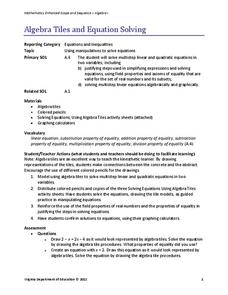EngageNY
Positive and Negative Numbers on the Number Line—Opposite Direction and Value
Make your own number line ... using a compass. The first installment of a 21-part series has scholars investigate positive and negative integers on a number line by using a compass to construct points that are the same distance from zero...
National Museum of Mathematics
Hands-On Data Analysis
Jump at the chance to use this resource. A kinesthetic activity has classmates jumping in several different ways (standing, single-step, and multiple-step jumps) to create handprints on poster paper taped to the wall. They measure the...
Alabama Learning Exchange
Exponents and Division
Create a human fraction to learn about division of exponents. Scholars develop the rule for division of exponents by being part of a human fraction to explore and justify the rule. They also consider zero exponents and negative exponents.
American Heart Association
Pi Day
Did you know a mathematician's favorite dessert is a fruit "pi"? By participating in a fruit cutting activity, young mathematicians realize one constant—the ratio of a circle's circumference to its diameter is always pi. It is a perfect...
CK-12 Foundation
Operations with Sets: Let's Roll the Dice!
There's no need to roll dice for this probability experiment, the resource includes them already. Scholars use an interactive to see how including more possibilities as favorable outcomes in a dice activity affects the probabilities....
CK-12 Foundation
Fundamental Counting Principle with and without Repetition: Outfit Combinations
But I have nothing to wear! Using an interactive, individuals create all possible outfits from three shirts, one belt, and two pairs of pants. Answering a set of challenge questions helps them see what they have learned from the experience.
CK-12 Foundation
Permutations and Combinations Compared: Colored Candies
Here's a sweet resource on sample spaces. An enticing interactive allows users to list all possibilities for the flavors of candy given to a friend. Scholars must also determine whether permutations or combinations are more appropriate...
CK-12 Foundation
Polygon Classification
Polly want a polygon? Young mathematicians sort shapes using an interactive. They classify the shapes as convex polygons, concave polygons, or not polygons.
Beyond Benign
Decision Graphic Introduction
E is for economics, environment, and social equity. The fifth installment of a 15-part series has scholars first considering ecological impacts, such as determining how much water it takes to produce a can of soda. They then use decision...
Exploratorium
Traveling Networks
Show your class the path to understanding graph theory. Scholars learn about basic graph theory using an activity based on the Bridges of Konigberg problem. They draw networks on the playground and decide whether it is possible to travel...
EngageNY
Rational Numbers on the Number Line
Individuals learn how to plot rational numbers on the number line in the sixth lesson of a 21-part module. They identify appropriate units and determine opposites of rational numbers.
Virginia Department of Education
Algebra Tiles and Solving Equations
Young mathematicians solve linear equations by drawing models of algebra tiles using colored pencils. To finish, they solve the same equations algebraically and check their answers using a graphing calculator.
Core Knowledge Foundation
A “Whole” Lot of Fraction Fun!
Young mathematicians are introduced to fractions in a unit that helps them to understand parts of a whole.
Berkshire Museum
Where’s the Water?: Acting Out Science Cycles
Young scientists transform themselves into rivers, oceans, clouds, and drops of water in order to explore the water cycle. After assigning and explaining to learners their different roles in the activity, the teacher reads aloud a...
Other popular searches
- Kinesthetic Math Games
- Kinesthetic Math Activities
- Kinesthetic Math Fractions
- Kinesthetic Math Subtraction
- Kinesthetic Math Lessons
- Kinesthetic Math Plans
- Kinesthetic Math Quadratic
- Kinesthetic Learner Math Time
- Kinesthetic Math Money















